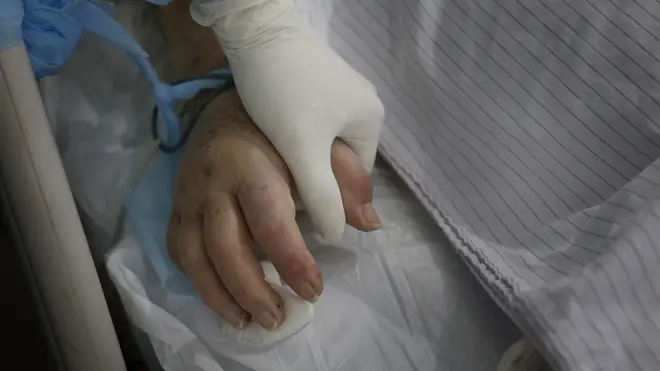
Henry Riley 4am - 7am
25 August 2020, 12:50

The number of people who caught coronavirus while being treated in hospital for other ailments is in the "minority," a new study has found.
Researchers from King's College London have looked into the cases of 1,564 COVID-19 patients during a two-month period at the peak of the pandemic and found just 12.5% had been infected during hospital treatment.
Just over a quarter of the patients in the study eventually died.
READ MORE: Education Secretary says masks in schools are not needed
Taking data from 10 facilities in the UK and one in Italy, researchers said death rates were "no worse" when comparing whether the virus was contracted in a hospital or in the community.
In fact, the study noted there were slightly lower death rates among those who got infected in hospital, which may be due to the fact they were surrounded by immediate treatment.
Those who contracted the virus in the community may have spent longer with their symptoms at home, it said.

Coronavirus in England: Areas with most new cases per 100,000 people
As a result, the authors have suggested this should "reassure" people of their worries when seeking out medical attention for illnesses other than coronavirus.
Lead author Dr Ben Carter, from the Institute of Psychiatry, Psychology & Neuroscience at King's College London, highlighted that the majority of patients to catch the virus in hospital had already been admitted "for a long time".
He added: "They were older, frailer and had pre-existing health conditions than patients infected in the community."
READ MORE: Birmingham to tighten lockdown rules from Wednesday
Senior-author and consultant geriatrician Dr Jonathan Hewitt, from Cardiff University, added: "With daily inpatient assessment of those already in hospital it is likely that there was prompt recognition of COVID-19 like symptoms and diagnosis of infection.
"In contrast those patients who became infected in the community would have declined as the disease progressed and may even have tolerated their symptoms at home for a period of time before requiring hospital admission.
"This difference in clinical management may have led to the patients already in hospital to have timely supportive treatment, as opposed to those coming from home who may have presented late with more severe illness."